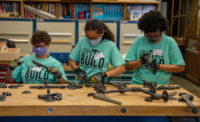Construction of the $2.5-billion Mariner East 2 pipeline in southeast Pennsylvania, originally allowed to proceed despite the statewide shutdown of non-essential work by Gov. Tom Wolf (D) to combat the COVID-19 spread, will now halt.
Initially considered exempt from thee March 19 directive as a “life-sustaining activity” by the Pennsylvania Utilities Commission (PUC), installation of new segments of natural gas pipeline continued into the next day, when the governor’s office clarified the project’s status as non-essential.
Work then pivoted to securing the sites, including filling open trenches and implementing soil stabilization measures.
According to a March 24 statement, owner Energy Transfer Partners said that after its pipeline construction sites were stabilized, it would “monitor and maintain the rights-of-way and work sites” in accordance with state environmental permit requirements.
The developer's contractors also are allowed to “secure, stabilize and move equipment at these sites under the enhanced safety measures” of the March 19 order. Maintenance on existing operational portions of the 350-mile three-pipeline Mariner East network will also continue as needed.
Utility sub-system and heavy and civil engineering construction projects were included among the types of non-essential businesses and activities included in Wolf’s order, which expanded his previous day’s directive shutting down more than 800 road and bridge construction projects statewide.
The commission initially justified allowing construction to continue, however, noting in a statement that “as essential services, utilities are expected to continue operations, including construction projects, which are considered essential per the governor’s essential business guidance at this time.”
The agency subsequently reversed its position with receipt of the updated directive.
Energy Transfer Partners did not respond to requests for comment.
Another energy project affected by the construction shutdown order is Shell’s $6-billion ethane cracker plant near Pittsburgh. One of the state’s largest construction projects, the multi-year program employed up to 8,000 workers, many of whom were bussed to the remote site each workday.
A Shell statement vowed to implement additional COVID-19 mitigation measures aligned with guidance from the Centers for Disease Control and Prevention.
“Once complete, we will consider a phased ramp-up that allows for the continuation of safe, responsible construction activities,” the statement said.
The PennEast gas pipeline, set to carry natural gas from the state to New Jersey for east coast markets, was recently allowed by the Federal Energy Regulatory Commission, to split the project into separate projects in the two states, but construction in Pennsylvania has not yet begun.
The project's New Jersey component also is before the U.S. Supreme Court related to a dispute over eminent domain issues involving state lands to be seized for the route.




Post a comment to this article
Report Abusive Comment